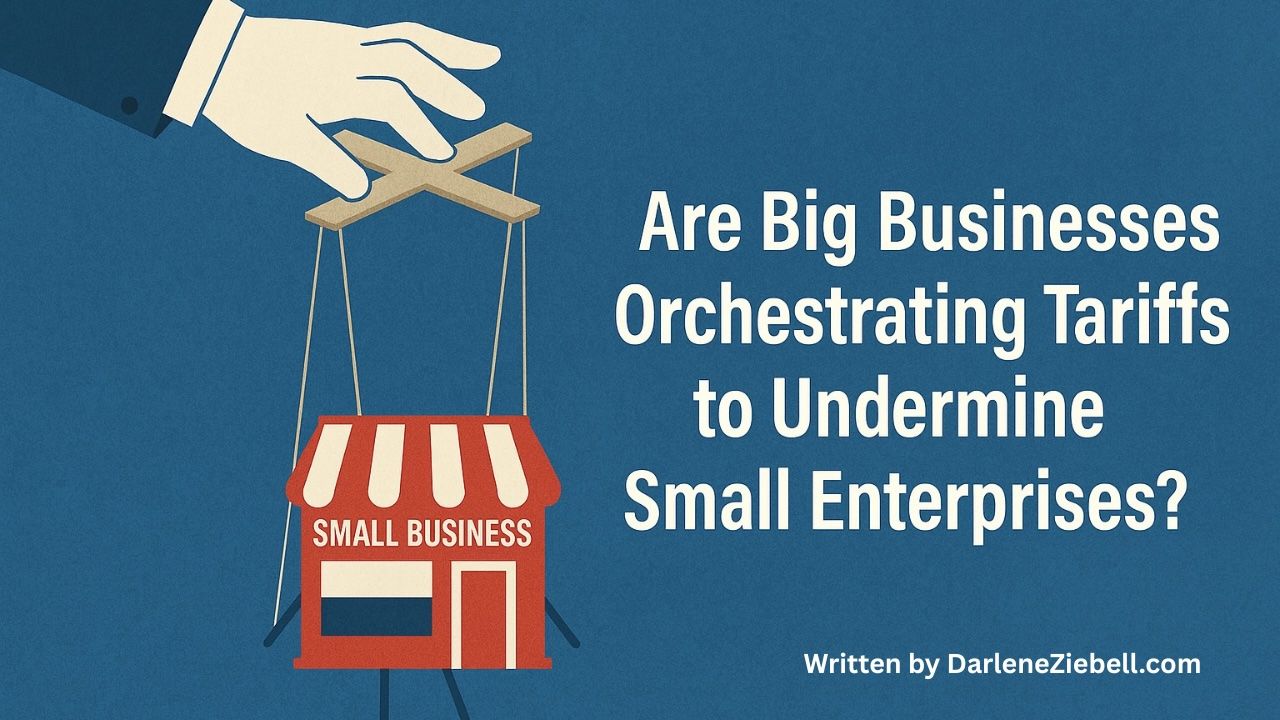Strings Attached: Are Big Businesses Orchestrating Tariffs to Undermine Small Enterprises?
May 11, 2025
Strings Attached: Are Big Businesses Orchestrating Tariffs to Undermine Small Enterprises?
In recent months, the U.S. has witnessed a significant shift in trade policy, marked by the implementation of the "Liberation Day" tariffs. These sweeping tariffs, reaching up to 145% on imports from countries like China, have been justified by the administration as measures to protect national interests. However, the disproportionate impact on small businesses raises questions about the underlying motivations and beneficiaries of these policies.
The Disproportionate Burden on Small Businesses
Small enterprises, often operating with limited margins and resources, find themselves bearing the brunt of these tariffs. Unlike large corporations, they lack the flexibility to absorb increased costs or restructure supply chains swiftly. For instance, Cassie Abel, owner of Wild Rye, faces $1.2 million in tariffs on an upcoming shipment, threatening the viability of her business.¹
Similarly, Ramon van Meer, founder of Afina, attempted to shift production of his shower heads from China to the U.S. in response to the tariffs. The move tripled production costs, and a test revealed that consumers were unwilling to pay the higher price for American-made products, leading to a sobering realization about market dynamics.²
Legal Challenges and Constitutional Concerns
The abrupt imposition of these tariffs has not only strained businesses but also sparked legal debates. In the case of V.O.S. Selections, Inc. v. Trump, small businesses challenged the administration's authority to enact such tariffs without congressional approval, arguing that it oversteps constitutional boundaries.³
The Role of Big Business
While small businesses grapple with these challenges, certain large corporations appear to navigate the tariff landscape more adeptly. Reports indicate that industries like aerospace have secured exemptions from the tariffs, suggesting that entities with substantial lobbying power can influence policy outcomes to their advantage.⁴
This disparity raises concerns about the equitable application of trade policies and whether they inadvertently—or deliberately—favor large corporations at the expense of smaller competitors. The consolidation of market power among big businesses could stifle innovation and reduce consumer choice, undermining the foundational principles of a competitive economy.
Liberation Day
The "Liberation Day" tariffs, while presented as protective measures, have unveiled a complex interplay between policy, power, and economic equity. The disproportionate impact on small businesses, coupled with legal challenges and the apparent advantages enjoyed by larger corporations, invites scrutiny into the true drivers of these trade policies.
Economic Disparities
Small businesses are the backbone of the American economy, comprising 99.9% of all U.S. firms and employing nearly half (45.9%) of the private sector workforce. They contribute approximately 43.5% to the nation's Gross Domestic Product (GDP).⁵
In contrast, large corporations, though fewer in number, wield substantial economic power. For instance, Berkshire Hathaway alone holds cash reserves of approximately $277 billion;⁶ however, small businesses often operate with limited cash reserves. A study by the JPMorgan Chase Institute found that many small businesses have a cash buffer of less than one month.⁷
The disparity in financial resilience between large corporations and small businesses raises concerns about the equitable impact of economic policies. While large enterprises can absorb increased costs and adapt to new regulations over time, small businesses may face existential threats from such changes. This dynamic suggests that policies like tariffs, while perhaps intended to protect domestic industries, may inadvertently favor larger corporations and undermine the viability of smaller competitors.
In light of these considerations, it's crucial for policymakers to assess the broader implications of economic measures and strive for strategies that support the diverse landscape of American businesses. Ensuring that small enterprises have the resources and support to navigate economic challenges is essential for maintaining a robust and inclusive economy.
A Troubling Question
As we navigate the shifting landscape of U.S. trade policy, one question lingers: What if these tariffs are not simply a protective measure, but a deliberate act to increase the wealth of the wealthiest corporations in the USA?
Written by Darlene M. Ziebell, a four-time entrepreneur who has built 7 and 8-figure businesses and a seasoned management consultant to the Fortune 1000. With firsthand experience on both sides of the economic divide, she understands the high-stakes challenges small businesses face.
Don’t miss tomorrow’s follow-up: Why Small Business Is Often Left Out of Major News Networks. Discover why your business story may never make the headlines.
Endnotes
¹ Al Jazeera - https://www.aljazeera.com/economy/2025/5/9/i-dont-have-the-cash-to-pay-for-these-tariffs-us-small-biz-suffers
² Business Insider - https://www.businessinsider.com/afina-shower-head-founder-tests-paying-more-american-made-2025-5
³ Wikipedia - https://en.wikipedia.org/wiki/V.O.S._Selections,_Inc._v._Trump
⁴ The Times - https://www.thetimes.co.uk/article/uk-us-trump-aerospace-exports-tariffs-lrltxmfzk
⁵ U.S. Chamber of Commerce - https://www.uschamber.com/small-business/small-business-data-center
⁶ Reddit - https://www.reddit.com/r/Infographics/comments/1ew5ftt/companies_with_the_most_cash
⁷ JPMorgan Chase - https://www.jpmorganchase.com/content/dam/jpmc/jpmorgan-chase-and-co/institute/pdf/jpmc-institute-small-business-report-exec-summary.pdf
Announcing The 1% Edge
If you like this blog article, check out my newsletter The 1% Edge. Designed to help business owners who want to thrive and reach their next 7 figures in business.


